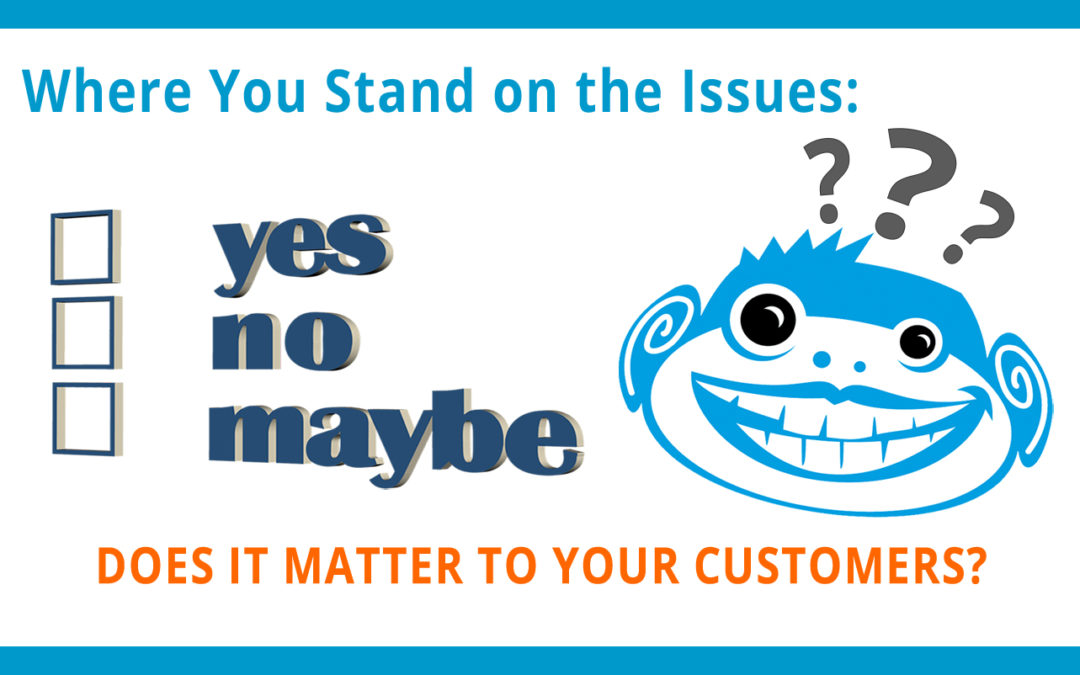Does your business take a stand on issues? As people, it’s difficult not too. After all, businesses are made up of people. We all have opinions, beliefs, and values—so taking a stand on an issue can be tough to avoid, whether it’s an official company stance or not, especially with social media making it easy for brands and their employees to share, comment, and post information at the click of a button.
As a marketing agency, Barrel O’Monkeyz gets to interact with a lot of different clients who may or may not take stands on issues for any number of reasons. Plus, of course, we have our own take on things.
Is there a best practice we can cite to provide guidance?
Taking a stance can show target customers that your values align with theirs. That can be good. Conversely, your stance may not align with your target customers. Thus, you run the risk of alienating customers, which can be bad.
Not taking a stand, though, according to the Forbes.com article, Should Companies Take Social Or Political Stands?, may make brands appear fickle or without values, and that can be even more problematic for a company.
For example, after COVID-19 hit, there was a sense among some brands that just putting something out there for the sake of adding a voice to the discussion wasn’t all that constructive or necessary. In light of all the pandemic-related physical, emotional, and economic suffering, many were sensitive that they might come across as tone deaf. Plus, how many more companies needed to say, “We’re all in this together”?
I’m a big believer that no reaction is still a reaction, and that a company’s customers rightly have certain expectations that the brand will communicate and be transparent in good times or bad. Such messaging can act as a reassuring “sign of life,” while doing nothing often sends the wrong message (I even wrote a blog about this recently, In Times of Uncertainty, Brands Must Be More than Fair Weather Friends).
What do the preferences of our target audiences tell us we should do?
According to digitalcommerce360.com, target audience “generations” have distinct differences in how much they care whether a brand’s values align with their own on social and political issues (such as charitable giving, sustainability, energy usage, diversity, etc.):
- Baby boomers (ages 54 to 72) tend to choose brands and products based mostly on their particular needs and price.
- Similarly, Gen Xers (ages 38 to 53) prefer companies that price fairly and produce family-friendly products. They don’t seem swayed much by whether a brand promotes sustainability or donates to charities.
- When it comes to millennials (ages 21 to 37), though, they show passion about brands and their positions on social and political issues, preferring to do business with companies that align with their beliefs and values.
- Likewise, Gen Z (ages 18 to 20) has the highest expectations when it comes to brands, with some 87% of this demographic expecting “more from brands than just products.”
Clearly, the age and preferences of your target audience can guide you in terms of the impact taking a stance might have on your business.
Shouldn’t businesses (and people) take positions simply because it’s the right thing to do?
As is this case with most things, there’s a right way and a wrong way to do things. In my opinion, taking a stance on an issue is not the same as telling others they need to believe the same way you do, or that their stance is invalid if they don’t agree with you 100%. It’s okay for people, businesses, and politicians to disagree on the issues.
When done thoughtfully and with respect for the opinions and values of others, taking a stance can be a powerful way to encourage discourse, cooperation, and problem solving. Otherwise, we’re all just living in an echo chamber. It’s often from disagreement on the problems and challenges we face, and our subsequent work together to fix them, that we come up with the best solutions.
For example, with the recent protests against racial injustice, some companies have been too afraid to take a stance. They’re worried about politics and offending someone, and how it might affect their bottom line. Believe me, I get it. We live in a time when people tend to be quick to cancel those who don’t agree with them.
But taking a stand doesn’t have to be “it’s my way and no other way.” We can “stand” for acknowledging a particular problem or issue exists and then for working to solve it in ways that are respectful, inclusive, and constructive. That’s not being fickle or wishy-washy. That’s being smart. That’s what we did. (See our blog, How Can You Make A Difference?).
As people and companies, we don’t have all the answers on our own. Together, though, we can do great things. What say you?
YOU MIGHT ALSO LIKE:
In Times of Uncertainty, Brands Must Be More than Fair Weather Friends
What ecommerce brands need to know about consumer activism by generation
Should Companies Take Social Or Political Stands?
How Can You Make A Difference?

